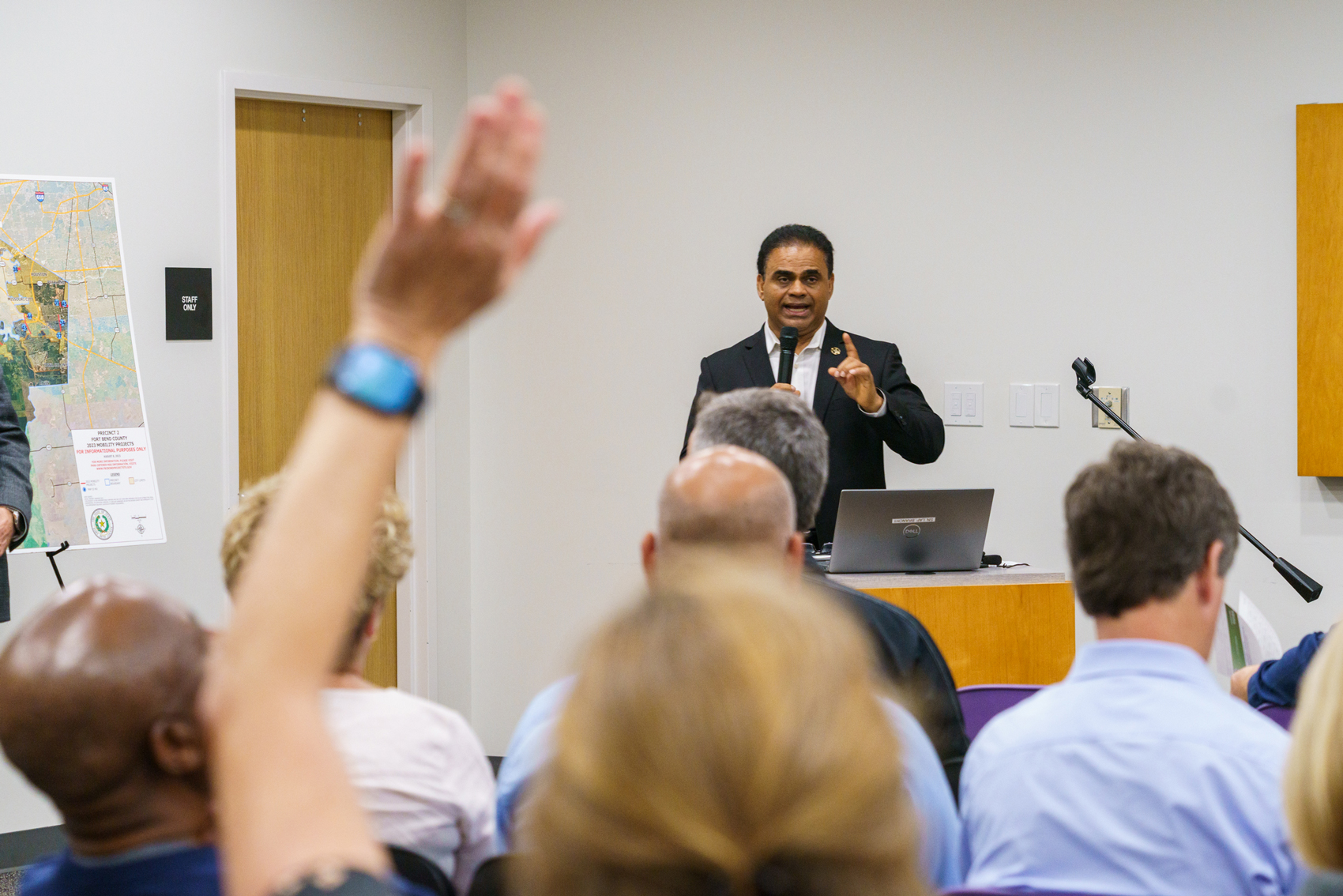|
Getting your Trinity Audio player ready...
|
Fort Bend County residents on Election Day will vote on the largest mobility and park bonds in the county's history.
The landmark bonds – $712 million for mobility and $153 million for parks – are aimed to provide infrastructure improvements across the county, including the completion of ongoing projects mostly from the 2020 bond election. Early voting begins Monday.
This year's mobility bond is $91 million more than the last three bond elections in Fort Bend combined. Fort Bend County Judge KP George said the size of the bond is an effort to plan for the county’s expansive future.

Fort Bend, one of the fastest-growing counties in the nation, is expected to have nearly 2 million residents by 2050, George said.
“We are simply looking to get ahead of the curve so that the quality of service our residents expect, we can continue to deliver,” George said.
However, some residents question if the county is being the best stewards of their money.
The Taxpayers Coalition, a grassroots organization of Fort Bend County residents focused on financial transparency and accountability in local government, say they are worried about the county’s efforts to pass the mobility bonds without feasibility studies or data-driven analysis.
“Where’s the data?” said Neeta Sane, chair of the coalition. “Where’s the data that supports the need to have (these projects) rather than politically driven activities or projects being injected? So that is our biggest concern. Everything should be data driven.”
Where is the money going?
If passed, the $712 million mobility bond will be used for infrastructure projects across the four precincts. This includes road rehabilitation and expansions, creation of traffic signals, sidewalks and more.
Recommended mobility and park bond amount for each Fort Bend precinct:
Mobility
- Precinct 1: $137,498,400
- Precinct 2: $227,521,928
- Precinct 3: $144,500,744
- Precinct 4: $183,481,928
- Countywide: $19,627,000
Parks
- Precinct 1: $18,660,500
- Precinct 2: $39,819,375
- Precinct 3: $25,793,500
- Precinct 4: $37,144,875
- Countywide: $25,563,500
Of those mobility funds, $245 million will be used to complete existing projects that were approved mostly from the 2020 bond election. George said the 2020 bond, which was for $218 million, asked for funds for initial phases of projects with plans to ask for the remaining amount later.
But over the last three years, costs have gone up drastically. About $82 million of the funds allocated to existing projects will be used to cover inflation. George said these costs were unprecedented.
Sane said she’s concerned about voters being on the hook for rising construction costs that could delay projects.
“What are the construction costs going to be in three years? Is it going to be doubled? So are they going to come back and ask for more?” Sane said. “There’s just no coordination.”
The $153 million park bond will go toward the construction of new parks, athletic fields, splash pads, community centers and more.
“In the middle of COVID, when the parks were closed, people were asking, ‘When are you going to open (the parks)? When can we go?’” George said. “Having good parks and park amenities around where you live is also quality of life. These are well thought out, and we want to improve the quality of life for our citizens.”
How are projects selected and who pays?
Each of the county’s four commissioners are the “boots on the ground” for projects that need the most attention in their precincts, George said.
The commissioners talk with constituents, community groups, homeowners association boards boards and more about the needs in their communities. They then bring a list of proposed projects and present them to the commissioner's court.
This year, the proposed projects totaled more than the current bond amount, and commissioners were asked to prioritize projects and hold off on some that could wait until the next bond election.
George said that no feasibility studies have been done on these projects, but it's something the county would consider in the future.
However, the county has estimated 15 years for mobility projects to be designed, bid on and completed, and five years for park projects. Historically, the county has only been able to complete $60 million in projects annually, Fort Bend County auditor Ed Sturdivant said.
If the bond should pass, commissioners court has promised residents that it will have no impact on their tax rate from the county. The county also decreased the tax rate by nearly 2 cents this fall. However, appraisal values in Fort Bend County are on the rise.
In 2022, the Fort Bend County appraisal district saw a 15.6 percent appraisal increase for residential properties. In the end, residents will still pay more in taxes.
George said the county and commissioner’s court has no control over the appraisal district.
“We are looking to address everybody's mobility needs,” George said. “We’ve always been in the process of catching up. Now we are looking to get ahead of the curve.”
More information about the 2023 mobility and park bonds can be found here.


